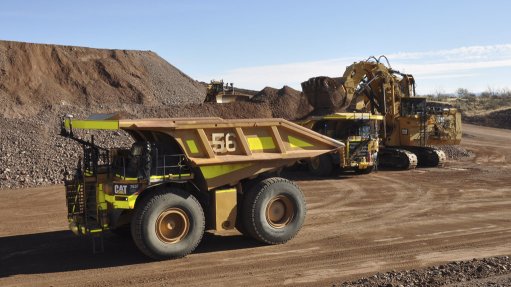Rising temperatures, rising risks: why adequate cover has become critical
This article has been supplied.
The knock-on effects of climate-related incidents have led to a noticeable increase in personal and commercial insurance claims, both in terms of property damage and business interruption. This has been exacerbated by the impact of deteriorating infrastructure such as public roads, water and sanitation systems.
Commenting on this topic is Karen Rimmer, Head of Distribution at PSG Insure, who says that with extreme weather events on the rise, households and businesses need to ensure they have appropriate insurance cover as a financial buffer for when the unexpected occurs.
The interplay between climate change and infrastructure
In South Africa, extreme weather events not only represent serious risks in and of themselves, but they also place already failing infrastructure and public services under added strain, exacerbating the impact.
“For example, an inefficient water supply system and leaking pipelines can worsen water scarcity, while stormwater drainage systems may no longer be able to effectively cope with increasing rainfall intensity, especially as urban areas continue to grow and develop.
Evidence of this domino effect can be found in examples such as the severe flooding which took place throughout KwaZulu-Natal in 2021. Torrential rain wreaked havoc on homes and businesses to the tune of billions of rands. In addition, several incidents of total infrastructure collapse were reported, including bridges, roads and water and sanitation systems,” says Rimmer.
More frequent heatwaves, on the other hand, can attribute to an increasing number of wildfires – which brings its own set of risks and challenges. The absence of effective firefighting resources, staff and equipment will increase the impact and magnitude of losses incurred for both commercial and personal lines clients. Rimmer asserts that this is particularly true in more outlying regions where firefighting support will take sufficiently longer to arrive to manage an outbreak.
Insurance as a vital safeguard
For households and businesses throughout the country, building resilience against these serious risks represents a growing need. One of the most fundamental contributors to that much-needed resilience, is insurance. Having the right type and level of cover serves as a financial safety net that can cushion the potentially devastating blow of mounting climate-related pressure.
As Rimmer elaborates: “While the current economic landscape has placed many households under financial pressure, cancelling an insurance policy or reducing the level of cover beyond the replacement value of a home or commercial property, for example, is a short-sighted solution.
Instead of making the decision to forgo insurance completely, homeowners and businesses need to consult their insurance adviser and work through the various measures that can be taken to make insurance more affordable, while ensuring they still have adequate cover in place.”
In addition, businesses also need to ensure they have business interruption cover in place to safeguard against loss of income or loss of profits should their assets be damaged or destroyed.
Important risk management measures
In terms of their terms and conditions, insurance policies typically place a duty of care for the prevention of loss on the client. This means that home and business owners need to take their responsibility in preventing unnecessary losses seriously.
For example, roofs and gutters need to be well-maintained and cleared of any excess debris to avoid storm damage from escalating and causing buildings to sustain otherwise preventable damage. Similarly, it is advisable to store vehicles and equipment in buildings or under carports, where they are less vulnerable to turbulent weather patterns – and especially if the terms and conditions of the policy require this.
As Rimmer concludes: “Your insurance adviser is here to provide advice and guidance on how to tailor your policy keeping both your unique needs and affordability in mind. This role is likely to become ever more valuable in the future, as the nature of climate-related risks become increasingly clear: insurance advisers will become an indispensable partner to their clients, helping them in assessing risks and identifying appropriate mitigation measures as weather patterns become more extreme.”
Article Enquiry
Email Article
Save Article
Feedback
To advertise email advertising@creamermedia.co.za or click here
Comments
Announcements
What's On
Subscribe to improve your user experience...
Option 1 (equivalent of R125 a month):
Receive a weekly copy of Creamer Media's Engineering News & Mining Weekly magazine
(print copy for those in South Africa and e-magazine for those outside of South Africa)
Receive daily email newsletters
Access to full search results
Access archive of magazine back copies
Access to Projects in Progress
Access to ONE Research Report of your choice in PDF format
Option 2 (equivalent of R375 a month):
All benefits from Option 1
PLUS
Access to Creamer Media's Research Channel Africa for ALL Research Reports, in PDF format, on various industrial and mining sectors
including Electricity; Water; Energy Transition; Hydrogen; Roads, Rail and Ports; Coal; Gold; Platinum; Battery Metals; etc.
Already a subscriber?
Forgotten your password?
Receive weekly copy of Creamer Media's Engineering News & Mining Weekly magazine (print copy for those in South Africa and e-magazine for those outside of South Africa)
➕
Recieve daily email newsletters
➕
Access to full search results
➕
Access archive of magazine back copies
➕
Access to Projects in Progress
➕
Access to ONE Research Report of your choice in PDF format
RESEARCH CHANNEL AFRICA
R4500 (equivalent of R375 a month)
SUBSCRIBEAll benefits from Option 1
➕
Access to Creamer Media's Research Channel Africa for ALL Research Reports on various industrial and mining sectors, in PDF format, including on:
Electricity
➕
Water
➕
Energy Transition
➕
Hydrogen
➕
Roads, Rail and Ports
➕
Coal
➕
Gold
➕
Platinum
➕
Battery Metals
➕
etc.
Receive all benefits from Option 1 or Option 2 delivered to numerous people at your company
➕
Multiple User names and Passwords for simultaneous log-ins
➕
Intranet integration access to all in your organisation

















